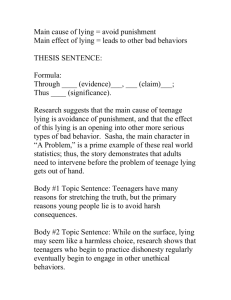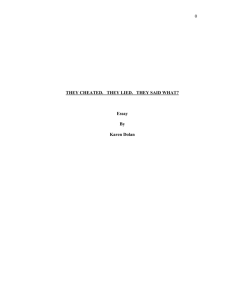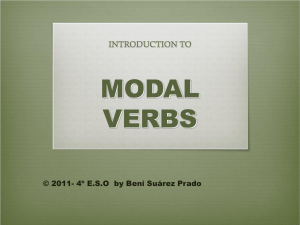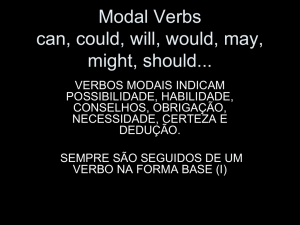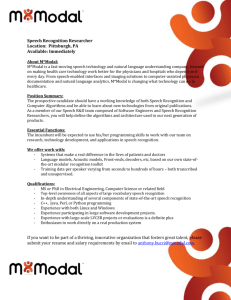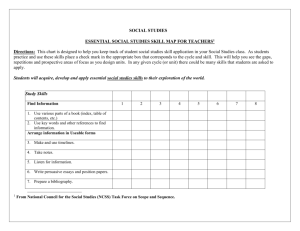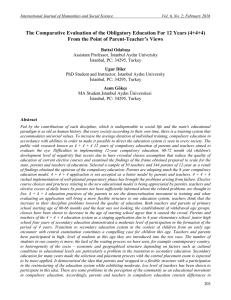Modal Verbs
advertisement
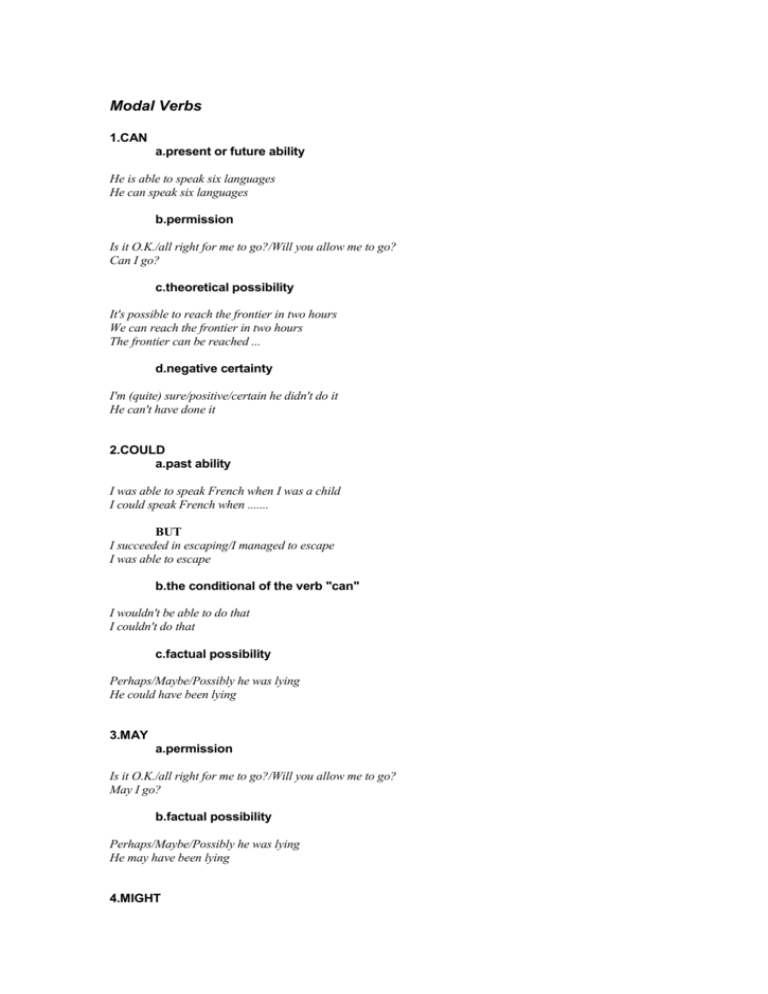
Modal Verbs 1.CAN a.present or future ability He is able to speak six languages He can speak six languages b.permission Is it O.K./all right for me to go?/Will you allow me to go? Can I go? c.theoretical possibility It's possible to reach the frontier in two hours We can reach the frontier in two hours The frontier can be reached ... d.negative certainty I'm (quite) sure/positive/certain he didn't do it He can't have done it 2.COULD a.past ability I was able to speak French when I was a child I could speak French when ....... BUT I succeeded in escaping/I managed to escape I was able to escape b.the conditional of the verb "can" I wouldn't be able to do that I couldn't do that c.factual possibility Perhaps/Maybe/Possibly he was lying He could have been lying 3.MAY a.permission Is it O.K./all right for me to go?/Will you allow me to go? May I go? b.factual possibility Perhaps/Maybe/Possibly he was lying He may have been lying 4.MIGHT a.factual possibility Perhaps/Maybe/Possibly he was lying He might have been lying 5.MUST a.obligation It is obligatory/vital for us to finish the work We must finish the work/The work must be finished b.prohibition It is forbidden to use calculators You mustn't use calculators/Calculators mustn't be used c.certainty I'm sure he's living here He must be living here 6.WILL a.future b.willingness He isn't willing/doesn't want to wait He won't wait c.conjectures/probability That is probably Ann phoning That will be Ann phoning d.inherent ability of things The key doesn't go into the lock The key won't go in the lock e.habit He is in the habit of often sleeping in He'll often sleep in 7.WOULD a.conditional tense b.willingness He was unwilling/didn't want/refused to help He wouldn't help c.conjecture That was probably my sister who answered the phone That would have been my sister ....... d.inherent capacity of things in the past My car refused to start My car wouldn't start e.repeated actions in the past He was in the habit of going out every night He would go out every night 8.SHALL a.future tense b.in questions to ask about the listener's opinion about a future course of action Where do you want me to sit Where do you think it's a good idea for me to sit? Where shall I sit? 9.SHOULD a.advisability It would be better/a good idea for you to phone first You should phone first It would have been better/a good idea for you to phone first You should have phoned first b.probability That is probably Ann phoning That should be Ann phoning 10.OUGHT TO "Ought to" has the same uses as uses a and b of "should". 11NEED a.modal vs lexical uses Modal Affirmative He needs to come Negative He needn't come He doesn't need to come Interrogative Need he come? Does he need to come? b.negative need absence of obligation It isn't obligatory to answer all the questions You don't need to answer You needn't answer all the questions 12.HAVE TO Lexical a.absence of obligation It isn't obligatory to answer all the questions You don't have to answer all the questions b.past obligation It was obligatory for us to wear a uniform We had to wear a uniform 13.USED TO a.repeated past actions or states that no longer hold In the past she lived in India She used to live in India 1. Use "must", "may (not)/might(n't)" or "can't" with the appropriate infinitive to rewrite the sentences. 1. Perhaps you have a virus. You .................................................... 2. I'm quite sure he is wrong. He ..................................................... 3. I'm sure he doesn't understand the problem. He ..................................................... 4. I'm positive they aren't using the same method. They ................................................... 5. Maybe he misunderstood. He ..................................................... 6. It's certain that he was hiding important information. He ..................................................... 7. I'm sure he didn't foresee this problem. He ..................................................... 8. Perhaps they'll try to undercut our prices. They ................................................... 9. I'm sure she hasn't misjudged the situation. She .................................................... 10.Perhaps they have overcharged you. They ................................................... 2. Instructions as above. 1. It's a virus, there's no doubt about it. It .................................................. 2. Perhaps you won't find him at home. You ................................................. 3. I'm quite sure that he panicked and ran away. He .................................................. 4. I'm positive that she wasn't listening to our conversation. She .................................................. 5. Maybe they are planning a surprise attack. They ................................................. 6. I'm sure he overheard what you said. He ................................................... 7. I'm sure there was some kind of misunderstanding. There ................................................. 8. Perhaps she couldn't remember the password. She ................................................... 9. It's obvious that he pressed the wrong button. He .................................................... 10.I'm sure that he hasn't found out about the plan. He .................................................... 11.It's obvious that there wasn't anybody at home. There ................................................. 12.There's no doubt about it, he's bluffing. He .................................................... 3. Rewrite the sentences using a suitable modal verb 1. I'm quite certain that the mistake was accidental. The mistake .................... 2. It's possible that the plan will succeed. The plan .................... 3. It would be better for us to wait before ringing. We .................... 4. I'm sure he isn't telling the truth. He .................... 5. Accessing that directory is forbidden. That directory .................... 6. It's possible to double your disk capacity with this compressor. You .................... 7. Perhaps they have had an accident. They .................... 8. It's vital that we should finish the project on time. The project .................... 9. I'm sure he didn't solve the problem by himself. He .................... 10. I managed to break the code. I .................... 11. It's not obligatory to wear a tie. You .................... 12. I'm positive they have met that man before. They .................... 13. It would have been a good idea for us to consult a price list before buying a new machine. We .................... 14. He is unwilling to collaborate. He .................... 15. It's possible that he made the same mistake. He .................... 16. I'm sure the company is losing money. The company .................... 17. It's not necessary for you to make back-ups. You .................... 18. It's obvious that the firm has not been making profits. The firm .................... 19. It's quite clear that they weren't making any progress. They .................... 20. It is forbidden to make copies of that file. You .................... 21. Perhaps he was trying to contact us. He .................... 22. I'm sure she isn't trying hard enough. She .................... 23. It's obvious that they received the message. They ....................

